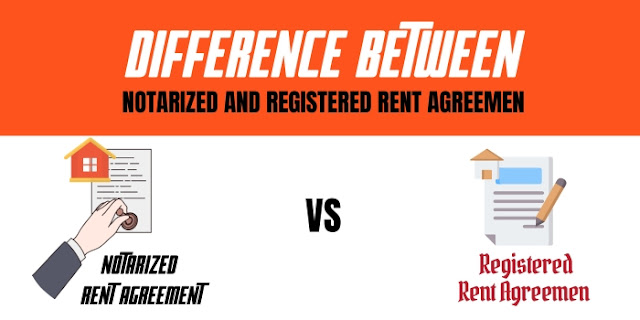What Is The Difference Between Notarized And Registered Rent Agreement?
Renting a property is a common practice, and a key aspect of this process is creating a formal agreement between the landlord and the tenant. This agreement, often called a rent agreement or lease agreement, outlines the terms and conditions of the rental arrangement, protecting the interests of both parties. Two common methods used to formalize these agreements are notarization and registration. In this blog, we'll delve into the differences between notarized and registered rent agreements, helping you choose the one that best suits your needs.
Notarized Rent Agreement
What is a Notarized Rent Agreement?
A notarized rent agreement is a document signed by both the landlord and the tenant in the presence of a notary public. The notary public is a government-appointed official responsible for verifying the identities of the parties involved and witnessing the signing of the document. The notary then affixes their seal and signature, indicating that the parties signed the agreement willingly and knowingly.
Advantages of a Notarized Rent Agreement
Convenience: Notarization is a relatively simple process that can be done quickly. It's often the preferred choice when both parties want to create a rental agreement without much hassle.
Legal Standing: A notarized rent agreement holds legal weight and can serve as proof of the agreement's authenticity in case of disputes.
Cost-Effective: Notarization is usually more affordable compared to registration, making it a cost-effective choice for rental agreements.
Privacy: Notarized agreements are not publicly accessible, offering more privacy to both parties.
Limitations of a Notarized Rent Agreement
Not a Public Record: Notarized agreements are not considered public records. Therefore, they may not be admissible in certain legal proceedings or disputes.
Limited Legitimacy: In some cases, a notarized agreement may not be sufficient for all purposes, especially if the law or local regulations require registration.
Registered Rent Agreement
What is a Registered Rent Agreement?
A registered rent agreement is a legally binding document that is registered with the local government authority, usually the sub-registrar's office. The agreement is signed by both the landlord and the tenant in the presence of two witnesses and a sub-registrar, who verifies the identity of the parties involved and the contents of the agreement. Once registered, the agreement becomes a public record and is admissible in legal proceedings.
Advantages of a Registered Rent Agreement
Legal Validity: A registered rent agreement is legally valid and holds strong evidentiary value in court. It provides an additional layer of protection for both parties.
Enforceability: Registered agreements are enforceable in the event of a dispute, ensuring that the terms and conditions of the agreement are upheld.
Government Record: The agreement becomes a government record, making it easily accessible and verifiable by third parties.
Limitations of a Registered Rent Agreement
Time-Consuming: The process of registering a rent agreement can be time-consuming and may involve several visits to government offices.
Costly: Registration typically incurs higher costs compared to notarization, as it involves government fees and charges.
Less Privacy: Since registered agreements are public records, they are accessible to anyone who wishes to view them, potentially compromising the privacy of both parties.
How to Choose Between Notarized and Registered Rent Agreements
The choice between a notarized and registered rent agreement depends on various factors, including your specific needs, legal requirements, and personal preferences.
Notarized Rent Agreement:
Suitable for short-term or informal arrangements.
Quick and cost-effective.
Ideal when privacy is a concern.
Registered Rent Agreement:
Recommended for long-term or formal arrangements.
Provides stronger legal protection and enforceability.
Necessary when local laws mandate registration.
In many cases, the decision may be influenced by local laws and regulations, as some regions require all rent agreements to be registered, while others allow for notarization.
Conclusion
In summary, the primary difference between notarized and registered rent agreements lies in the level of legal protection and accessibility they offer. While notarized agreements are more convenient and cost-effective, registered agreements provide a higher degree of legal validity and enforceability. When deciding which option to choose, consider the nature of your rental arrangement, local legal requirements, and your personal preferences. It's essential to make an informed decision to ensure that your rights and interests as a landlord or tenant are adequately safeguarded


%20(18).jpg)